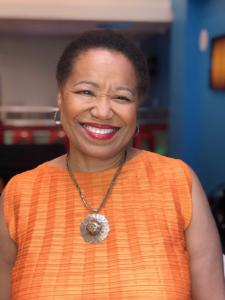After an election marked by extreme rhetoric, whatever the outcome, half the country would dwell in grief, convinced the world’s oldest democracy was finished
WASHINGTON, DC, UNITED STATES, January 2, 2025 /EINPresswire.com/ -- In a new Washington Monthly article, Dr. Gail C. Christopher asserts that the November election warrants a “much deeper examination” of what happened, how it happened, and the impact on the nation’s health, well-being, and hope for the future.
She emphasizes, “It’s a bit cliché, but this must become a teachable moment. We must learn from this campaign never to be so divided again.” It is an urgent call to action.Dr. Christopher, the Executive Director of the National Collaborative for Health Equity (NCHE), said she reached the conclusion that a deep dive is necessary after visiting a friend who was overwhelmed by the election results.
“A few days ago, I stopped by a local nonprofit run by a friend who helps refugees, immigrants, and formerly incarcerated victims of abuse get jobs that can transform their lives,” she wrote. “I was there to donate, and when I found my friend distressed, I asked why he was so down. He had recently lost his dog of 14 years. Then, days later, his mother passed. I embraced him, expressing my condolences. As we embraced, he said, “And then my country died.”
His reference, she wrote, was “to the election, which put one party in charge of the White House, Senate, and House. And in that moment, I realized that perhaps half of the nation’s voting population is grieving what they perceive to be the death of their country. I contemplated how America came to this. After an election marked by harsh and extreme rhetoric, whatever the outcome, half the country would dwell in grief, convinced that the world’s oldest democracy was finished. Why?”
Dr. Christopher explained why the election campaign unfolded as it did.
“The campaign rhetoric was often shaped in terms of strong men,” she wrote. “Well, I have known some strong men in my life. My father was a strong man. Serving in Europe during World War II, he was lucky; he came home alive, met my mother, and started a family. I think of my son as a strong man. He is a choreographer, dancer, and artist. I have a friend who is Jewish but professes to be an atheist who's dedicated his life to civil rights. Another strong man in my life is my handyman, who unclogs toilets, removes trees downed by high winds, and never says no to my obsession with needing new bookshelves. What bonds them is a strength characterized by hard work, dedication, service, compassion, kindness, a minimum of complaint, and no self-pity. “
Further, she wrote, “Each of my strong men supports a woman's right to choose and to reproductive healthcare. Their qualities sharply contrast those targeted by campaigns in rural, suburban, and urban America toward men of all ages, races, and ethnicities with an urgent need to simultaneously feel strong and victimized. With extremist views rising at home and abroad, these men are the followers, searching for ways to embrace symbols and positions perceived to make them look strong.”
More significantly, she added, “Today, strength for too many males is characterized by bombast, lying, bullying, violence, and attacking the vulnerable.”
In other examples, Dr. Christopher noted that some campaign groups spent over $21 million on ads demonizing the transgender population, while only 1.7 % of the global and U.S. population experiences genetically based variations in sexual expression. And the lie was spread that immigrants committed high rates of crime in the country when the opposite is true.
“The demonization is possible because of toxic social media, algorithmically driven communications, and the news landscape,” she wrote. “This social media environment manipulates emotions using fear and hatemongering for personal and political gain. There must be reform and regulations to stop the lies and fake news from becoming ingrained as conventional wisdom. This must not be allowed to shape future campaigns.”
Dr. Christopher maintained that unregulated social media is contributing to the stress and grief experienced during and after this recent campaign. “It’s naive to think this tumult will pass on its own. This level of despair and hopelessness does not bode well for our democracy. Violent rhetoric and bullying the vulnerable can unleash an addictive cascade of hormones. In other words, the more you bully, the more likely you want to do it.” The negative impact of unregulated social media is a pressing issue that needs to be addressed.
Dr. Christopher, one of the nation’s leading experts on healing, offers recommendations on how American society can stand up against the onslaught of violent rhetoric, lies, dehumanization, and cruelty that was centered in a presidential election campaign.
Read her full article HERE.



No comments:
Post a Comment